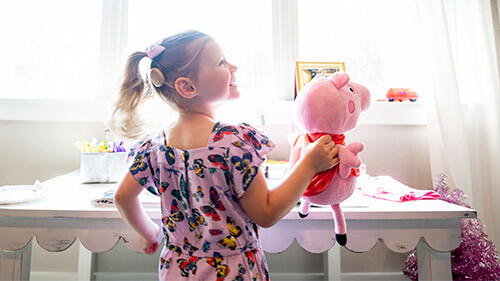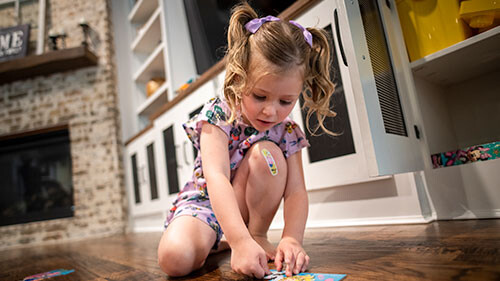
Finley
Aug 29, 2019, 11:26:32 AM CDT
She knelt on the hardwood floor, examining the cardboard pieces scattered in front of her.
Finley needed a few more pairs that fit together to complete the puzzle – a 24-piece box set that showed Minnie Mouse in a pink polka dot dress holding a microphone in the air.
She leaned forward to grab a piece, her wavy-haired ponytails swinging toward her forehead and exposing the cochlear implants attached underneath.
“I got one, I got one,” she squealed, holding up two pieces.
“Good job, baby,” her mom, Madeline replied.
A 4-year-old puzzle master -- as her parents call her -- Finley began whizzing through puzzles shortly after she learned to walk. Sometimes, she’d even do them flipped over with the picture facing the ground.
“She could do puzzles that were multiple years beyond her age,” said Finley’s dad, Steven. “She had this laser focus.”
As a toddler, there was no noise to distract her. No sound of someone calling her name, a television show or song to shift her focus.
Finley couldn’t hear those sounds because she is deaf.
Her newborn screening did not detect any abnormalities in her hearing, but her parents were concerned. They took her to Children’s Health, where clinicians diagnosed Finley with Auditory Neuropathy -- a hearing disorder where the inner ear successfully detects sound but has a problem sending sound from the ear to the brain.
“We’d sang her a million-and-one songs trying to put her to bed or rock her to sleep at night, and she’d never heard any of it,” Madeline said. “She’d never even heard us say, ‘I love you.’”

Since Madeline and Steven are hearing parents, they turned to cochlear implant surgery at Children’s Health to help Finley hear and speak, in addition to using sign language to communicate.
“I knew she’d be in really good hands at Children’s. They have some of the best surgeons in the world there,” Madeline said. “We didn’t look anywhere else, honestly.”
Finley’s cochlear implants, which her parents nicknamed her “ears,” were first turned on when she was 18 months old. She cried when the audiologist banged on a block (a normal initial reaction for children after cochlear implant surgery).
Now 4 years old, Finley is enrolled in a deaf education pre-school and speaks at almost a 3-year-old level, using a mix of sign language and speech to communicate with her parents. She wears the cochlear implants most of the time, only removing them before bed and baths (unless her parents waterproof her “ears”).
At home, Finley shuffles alphabet flash cards in a heap on the living room coffee table, searching for the letters to spell out her first and middle names. She signs and says the name of the letter as she finds each one.

“F-I-N-L-E-Y-R-U-E,” she says, pointing to the letters as she calls them out one-at-a-time.
She lines up the letters in a row. Grinning, she stands back – hands behind her back, chest puffed out proud -- like she triumphantly landed the flip at the end of an Olympic gymnastics routine.
“Finley Rue,” she says, this time altogether.
In a year, she’ll start kindergarten and Madeline and Steven will have to decide whether to keep her in the deaf education program or enroll her in their neighborhood public school.
“Deaf children can do exactly what everyone else can do,” Madeline said. “Whatever she wants to be when she grows up or do in life, we’re going to let her do it. She just might have to waterproof her ears first.”
Read more patient stories like Finley's to learn how Children's Medical Center Foundation impacts the lives of North Texas children.
Support patients like Finley on North Texas Giving Day
Gifts made on Sept. 19 will have triple the impact. Learn more about getting involved and giving to the cause here.
Kids count on us. We count on you.
Give to support innovative research, lifesaving treatments and compassionate care.
Did you enjoy this story?
If you would like to receive an email when new stories like this one are posted to our website, please complete the form below. We won't share your information, and you can unsubscribe any time.

